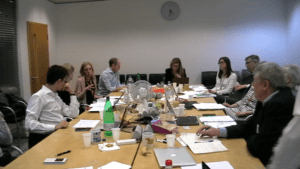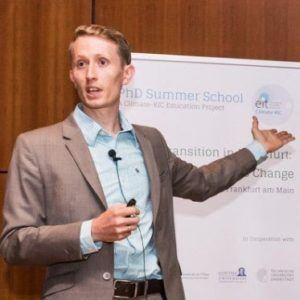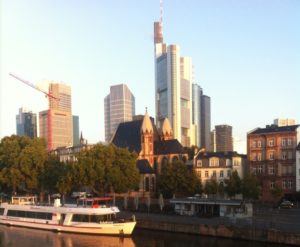Profile
Stephen Richardson
Was it something I said? Oh well, good luck to the remaining engineers!
Curriculum Vitae
-
Work History:
I have worked in a pub, a doctor’s surgery, a french hotel, an IT firm, an engineering consultancy and a county council – and now I work at a university and a supermarket!
-
Current Job:
Doctoral Research Engineer
-
Employer:
University of Reading
-
My Work
I’m researching how to build supermarkets from more environmentally friendly materials
-
Read more
I’m in the final year of a four year doctorate and am researching how to reduce the carbon footprint of supermarket buildings.
Did you know that in the UK there are enough new supermarkets opened every year to cover 60 football pitches?
My research focusses on the materials that a supermarket is built from – usually lots of concrete and steel! For an average sized store, the carbon footprint of all that material is around 5000 tonnes. But what does that number mean? Is that a lot? How do we work it out? Should a supermarket spend money on different materials to make that number smaller? Or are there better things it could do with its money to help the environment?
These are all questions that I have been thinking about in my research.
One of the main parts of my work over the last year has been to build a calculation programme for working out the carbon footprint while the building is still being designed. This will allow the designers to see how choosing different materials might make the building more environmentally friendly.
-
My Typical Day: Currently I’m either playing with spreadsheets and writing macros, or planning and running interviews and workshops wiith other experts.
-
Read more
What my typical day looks like has changed quite a bit throughout the four years of my course.
At the moment I spend a lot of time in front of my laptop working on spreadsheets and producing graphs. But rewind a few months and I was really busy preparing a big workshop and inviting lots of experts to come along to it. After pursuading them all to come to my event, I then had to lead them through a series of excercises – a bit like being back at school – and get them to discuss the results they each came up with.
Here’s the group of experts hard at work!

A few months before that I was jetting around Europe. The photo on the left is Frankfurt, Germany where I stayed for two weeks as part of a competition to promote renewable energy (which my team won!). Then it was on to a conference in Barcelona, Spain, where I presented some of my research, and after that, I was in Brussels, Belgium, at a two day event with Climate-KIC, a leading EU organisation that supports entrepreneurs and researchers working on climate change solutions.
As a researcher, it’s really important that I take every chance I have to tell people about the work I’m doing. So I spend quite a bit of time preparing and giving presentations in different places.
Here I am presenting our winning idea at the competition in Franfurt

Every month there’s something different to sink my teeth into which is one of the things I love about my job.
-
What I'd do with the money
I would use the money to provide new climate-change related activities and materials for local schools as part of the University of Reading’s existing STEMnet outreach programme.
-
Read more
The researchers that I work with are doing some amazing and exciting stuff, exploring all sorts of ways that buildings and the environment are affected by each other:
finding out how to make a Formula 1 racing venue more environmentally friendly
or how trees in cities can help to keep people and buildings cool
or looking at how homes can become mini power stations; not just using but also generating and storing energyAnd we spend a lot of time trying to tell other people about our work. But mostly we just tell other researchers by writing long reports or giving presentations. I think it’s time we focussed more on telling school students about our work, to inspire them to think about how the way we live affects our climate and how science and engineering can help us live more sustainably.
So I would spend the prize money on developing tools and materials to do that. The University is already a regional hub for STEMnet – doing amazing work to inspire young people about Science, Technology, Engineering and Maths – so we would build on the success of that existing project and expand it to provide more climate-change related activities and resources and get them in the hands of school teachers and pupils.
Because at the end of the day, the reason we care about protecting the environment is so that it’s still there to enjoy for everyone who comes after us – you and your kids and your kids’ kids and your kids’ kid’s kids and… you get the picture!Here’s a short video clip from YouTube which gives more examples of the exciting things we do at TSBE:
-
My Interview
-
How would you describe yourself in 3 words?
Husband, father, engineer
What's the best thing you've done in your career?
Worked with some amazing people from around the world
What did you want to be after you left school?
For a while I wanted to be an archeologist – I think because of watching the first Jurassic Park movie
Were you ever in trouble at school?
The odd detention here and there, nothing serious
If you weren't doing this job, what would you choose instead?
I’d be a leadership coach – I love to see others develop and reach their full potential
Who is your favourite singer or band?
Very hard to choose… probably Foy Vance, at the moment at least!
What's your favourite food?
Thai food
What is the most fun thing you've done?
Had kids – they’re amazing! It’s also the hardest thing I’ve ever done!
Tell us a joke.
What cheese should you use to bait a bear trap? … Camembert
-

